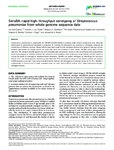SeroBA: rapid high-throughput serotyping of Streptococcus pneumoniae from whole genome sequence data
Epping, Lennard
van Tonder, Andries J.
Gladstone, Rebecca A.
The Global Pneumococcal Sequencing Consortium
Bentley, Stephen D.
Page, Andrew J.
Keane, Jacqueline A.
Streptococcus pneumoniae is responsible for 240 000–460 000 deaths in children under 5 years of age each year. Accurate identification of pneumococcal serotypes is important for tracking the distribution and evolution of serotypes following the introduction of effective vaccines. Recent efforts have been made to infer serotypes directly from genomic data but current software approaches are limited and do not scale well. Here, we introduce a novel method, SeroBA, which uses a k-mer approach. We compare SeroBA against real and simulated data and present results on the concordance and computational performance against a validation dataset, the robustness and scalability when analysing a large dataset, and the impact of varying the depth of coverage on sequence-based serotyping. SeroBA can predict serotypes, by identifying the cps locus, directly from raw whole genome sequencing read data with 98 % concordance using a k-mer-based method, can process 10 000 samples in just over 1 day using a standard server and can call serotypes at a coverage as low as 15–21×. SeroBA is implemented in Python3 and is freely available under an open source GPLv3 licence from: https://github.com/sanger-pathogens/seroba
Files in this item

